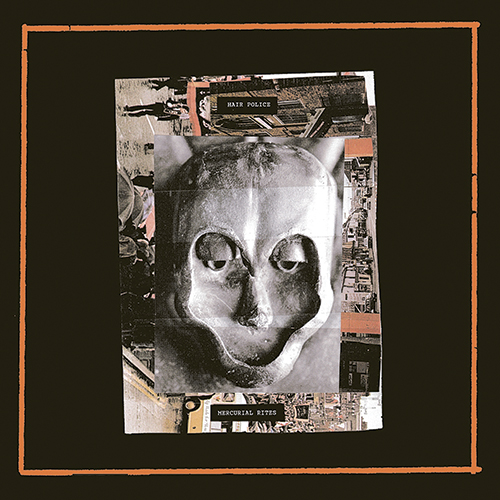Our country’s noise scene is dying. And before you rush to your computer to email me about how you or your friend are currently in between two and seven noise projects, allow me to offer a preemptive shushing: I’m talking about noise acts that take their shows on the road, where they play for actual people who pay money to see them.
This ain’t your mama’s Police

Our country’s noise scene is dying.
And before you rush to your computer to email me about how you or your friend are currently in between two and seven noise projects, allow me to offer a preemptive shushing: I’m talking about noise acts that take their shows on the road, where they play for actual people who pay money to see them.
That part of noise is dying—the traveling monuments to cacophony that blow through every major city across the globe. While the world’s hip elite are busy commodifying one genre after the next in search of a new sound or scene, a dedicated few remain loyal to their particular genre long after it falls out of favor.
Every genre has a few, and noise isn’t without its stalwarts. One of them is Hair Police, and the band has put out its first record in five years, Mercurial Rites. Is it worth the five years’ drought? Is any noise record ever worth waiting five years for? Read on.
While Hair Police has taken five years between full-lengths, the language there is important—five years between full-lengths. Prior to the gap between Mercurial Rites and the band’s last LP, Certainty of Swarms, there were many EPs peppering the Hair Police discography.
In 2004, the band released (or was featured on) nine different albums. Hair Police has never been short on material—until the great dry spell that lasted five years and recently ended.
And just how much variance can there be in the noise genre? Considering that noise is widely defined as “anti-music”—that is, a collection of sounds that defies any kind of theory, tempo or timbre—it’s difficult
to describe.
If Newton’s third law holds, for every type of music there must be a type of anti-music. It covers many bases, and since Hair Police’s 2002 album, Blow Out Your Blood—which happens to be one of my favorite noise albums of all time—the band has covered many of those bases. Now that Hair Police has had five whole years to stew, what’s left?
It wouldn’t be a stretch to call Mercurial Rites a sampler platter of past Hair Police works, and the term “greatest hits” shouldn’t apply to any noise act ever. However, the track selection begins as classic early aughts Hair Police and concludes with what could be called the band’s tribute to Michael Gordon’s score from Decasia.
The seeds to the conclusion are planted early on. The first track, “We Prepare,” is experimental even by Hair Police standards. While it contains the requisite sprawls of feedback, the vocals are mixed shockingly high for a noise record; and because it exhibits an actual mastering job, the listener immediately gets the impression that he’s listening to “noise professionals,” as weird as that may sound.
Adding to this professional vibe are lyrics that even contain the title of the song, raspy as they may be.
One thing that hasn’t been diluted during the band’s sabbatical is Mike Connelley’s vocals—they’re just as disgusting and shrill as ever. Compared to Blow Out Your Blood, they’re even somehow harsher.
Black metal caterwauls fill the cracks where Connelley’s calculated yet torpidly sleazy vocals once thrived, and everything else has been replaced with distorted yawns.
From here, the record slowly evolves into an exercise in anti. Dislocated ambient grooves lock horns with classic Whitehouse-esque power electronics—it’s like what Brian Eno would make if he got really mad for five years.
One thing that’s kept constant throughout the record’s duration is filth, and lots of it. The record drips with murky uneasiness; not once during the entire record is there a moment when the uneasiness fades away.
That aforementioned uneasiness reaches its apex on “The Scent,” likely the pinnacle of what Mercurial Rites sets out to be: a noise record with actual dynamics. “The Scent” is one of the most unsettling tracks I’ve heard in years.
Connelley’s vocals, an octave or two beneath his natural register, growl and hiss over a midrange drone while squelches of feedback leap from the speakers.
While these points are all well and good, Connelley doesn’t grab the mic again until the last track, and by track seven, “Scythed Wide,” the sound collage thing begins to lose a little steam.
While the sounds and textures are quite interesting, the listener knows that behind all this sits a vocalist on the verge of exploding. Parts of the instrumentals surrounding “Scythed Wide” sound like late ’90s Photek, which is always a welcome addition to a sound collagist’s repertoire.
Mercurial Rites
Type Records
Out now
★ ★ ★★
The last track on the album—the title track—is a wonderful meshing of classic Hair Police and the new stuff. Connelley barks and whispers through some truly inspired anti-jazz. The record ends with a burst of ride cymbal, then nothing at all. The ride is over.
Every city has a so-called noise scene where, sure, you can hear a bunch of dorks futz around with mixer feedback loops all day—but listening to stuff like this really shows why Hair Police are in a league of their own.
As I said, there are just as many genres of non-music as there are regular music. While novice noise musicians have the harsh noise angle battened down, it truly takes a master of the craft to explore uncharted territory and create a dynamic collage out of new anti-matter.





